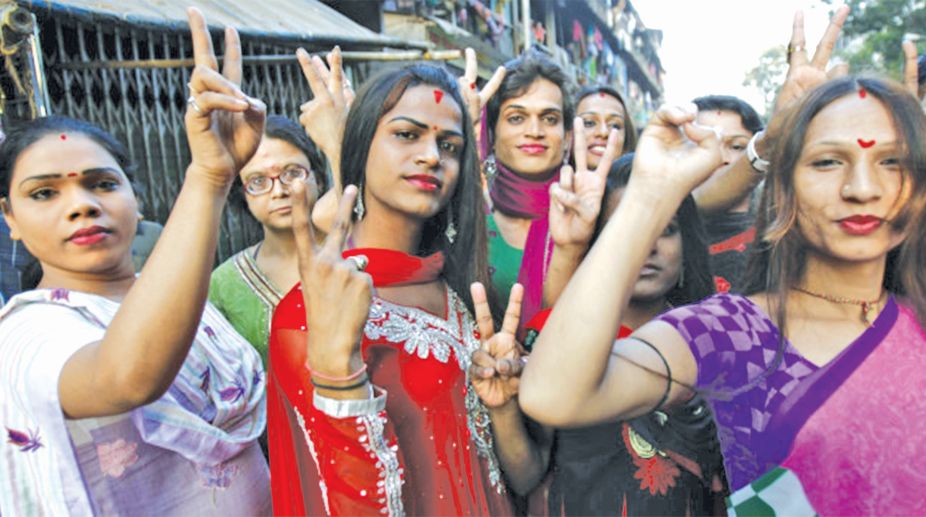The word “transgender” is an umbrella term used to describe people who identify with a different gender than the one assigned to them by birth. In addition to including people whose gender identity is the opposite of their assigned sex (trans men and trans women), this term also includes people who are not exclusively masculine or feminine (people who are intersex, genderqueer or non-binary, including bigender, pangender, genderfluid, or agender). Being transgender is independent of sexual orientation as they may be heterosexual, homosexual, bisexual, asexual, or may choose not to define their sexuality.
The Supreme Court of India on 15 April 2014 recognised a third gender that is neither male nor female, stating “Recognition of transgenders as a third gender is not a social or medical issue but a human rights issue.”
Although the Constitution provides for the fundamental right to equality, tolerates no discrimination on the grounds of sex, caste, creed or religion and guarantees political rights and other benefits to every citizen, people of the third gender (transgenders) continue to be ostracised and mistreated.
Our archaic principles and orthodox mind-sets have deprived them several rights that Indian citizens take for granted, such as the rights to vote, own property, marry, claim a formal identity through a passport and a ration card, a driver’s license, education, employment, health and so on.
Some of the social as well as emotional problems faced by transgenders in India are:
Discrimination: Transgenders need valid identification documents to live a normal life. However, the name and gender change process is complicated and sometimes prohibitively expensive and there are very few documents which allow the “transgender” option on the application forms.
They face discrimination at governmental offices where their appointments are pushed aside, delayed or cancelled. This is prohibitive for them to obtain their documents which are essential to open bank accounts, start new jobs, enrol in school or travel. They face undue discrimination even in healthcare situations where hospitals refuse to treat them, provide faulty healthcare or even refuse to give them proper tests.
Types of discrimination reported by the transgender communities in the healthcare settings include deliberate use of male pronouns while addressing them; registering them as “males” on application forms and admitting them in male wards in hospitals; humiliating them by making them stand in the male queue; verbal harassment by the hospital staff and other patients; lack of healthcare providers and doctors who are sensitive to and are trained on providing treatment to transgender people and even denial of medical services.
Social problems: The transgender community still faces considerable stigma and are characterised as being mentally ill, socially deviant and sexually predatory. They are often denied jobs due to lack of identity documents. They are also denied education in most schools as they are neither male nor female and do not have the required identity proof to plead their case.
In another scenario, they are not allowed to book hotels, make reservations in places or rent apartments or houses as documents showing identity proof are required. This is the reason transgenders are pushed to poverty and begging.
Immigrants: Transgenders who are immigrants from other countries face tremendous difficulties to return to their home nation without any valid or legal documentation. As they are denied even the most basic identity proof documents, these people are left behind, nameless.
Most transgenders in India undergo local gender reassignment surgeries from quacks and so there is no official hospital record of the surgery or transformation happening. This leaves them powerless in the identity and name change process.
Poverty and Prostitution: Transgenders are unduly marked as dirty, impure or filthy and people steer clear of them in general. However, they are people, just like the rest of us. But lack of documentation forces them to beg for a living or join prostitution to get rid of financial woes. These are choices they have to make due to society’s restraints and not because they are impure.
Although the discrimination is prevalent in India, the scene is slowly evolving as our government recognises transgender people and provides them with identification documents.
In 2014, the Supreme Court declared that “The transgender community, generally known as ‘Hijras’ in this country, are a section of Indian citizens who are treated by the society as ‘unnatural and generally as objects of ridicule and even fear on account of superstition’”.
In its historic decision, the Supreme Court passed the ruling that “In view of the constitutional guarantee, the transgender community is entitled to basic rights i.e. Right to Personal Liberty, Right to Freedom of Expression, Right to Education and Empowerment, Right against violence, Discrimination and exploitation and Right to work. Furthermore, each and every individual must be authorised to decide their own gender expression and gender identity, including transsexuals, transgenders and hijras and so they must be legally considered as the third sex.”
Presently, a “transgender” or “other” option is available under the gender marker in legal documents such as voter’s identity card, driving license, ration card, bank account and records, debit/credit card, pan card, passport and birth certificate.
The writer is founder, ItzEazy.in






